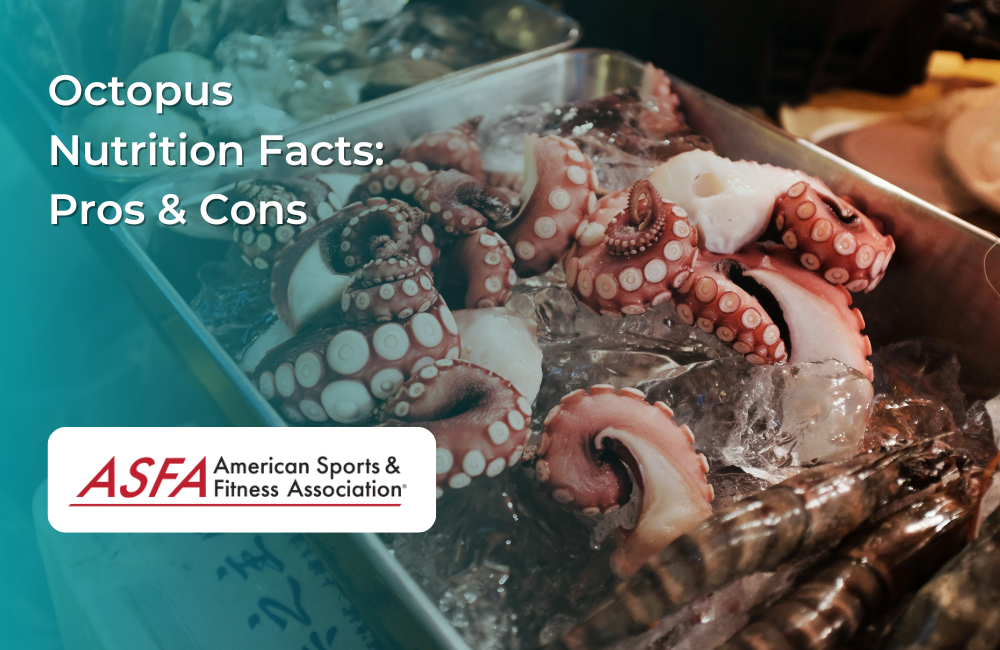Octopus is a nutrient-dense seafood that provides high-quality protein, essential minerals, and omega-3 fatty acids. It is a lean, low-calorie protein source commonly used in Mediterranean and Asian cuisines. While octopus offers several health benefits, factors like cholesterol content and sustainability should be considered.
Octopus Nutrition Facts, Pros, Cons (Per 3.5 Ounces, Cooked)
-
Calories: 164
-
Protein: 29g
-
Carbohydrates: 4g
-
Fat: 2g
-
Saturated Fat: 0.5g
-
Omega-3 Fatty Acids: 370mg
-
Cholesterol: 96mg
-
Sodium: 230mg
-
Iron: 8mg (45% of Daily Value)
-
Vitamin B12: 30mcg (Over 100% of Daily Value)
-
Selenium: 76mcg (138% of Daily Value)
-
Potassium: 630mg
-
Taurine: An amino acid that acts as an antioxidant and supports immune function.
Nutritional Benefits of Octopus
High in Lean Protein
-
Provides 29g of protein per serving, supporting muscle growth and repair
-
The high protein content contributes to the nutritional benefits of octopus, supporting muscle growth and overall health
-
A great low-fat alternative to red meats
Rich in Essential Vitamins and Minerals
-
Vitamin B12 supports red blood cell formation and brain function
-
Iron helps prevent anemia and boost energy levels
-
Selenium acts as an antioxidant that supports immune and thyroid health
Good Source of Omega-3 Fatty Acids
-
Supports heart health, reduces inflammation, lowers blood pressure, and improves brain function
-
Contains healthy fats with minimal saturated fat
-
Omega-3 fatty acids in octopus can help lower blood pressure and reduce the risk of heart disease
Low in Calories and Fat
-
Helps with weight management while providing essential nutrients
-
A great option for high-protein, low-calorie meal plans
-
Choosing fresh octopus can enhance its nutritional benefits, making it a great option for weight management
Heart Health
Brain Function and Antioxidant Properties
Octopus is not just a treat for your taste buds but also a powerhouse for your brain. Rich in antioxidants like selenium, vitamin B12, and vitamin E, octopus helps neutralize free radicals that can damage cells, including brain cells. This antioxidant action can reduce the risk of cognitive decline and neurodegenerative diseases such as Alzheimer’s and Parkinson’s. Moreover, the omega-3 fatty acids, particularly EPA and DHA, found in octopus are essential for brain health. They promote cognitive function and reduce inflammation, making octopus a smart choice for maintaining cognitive health and overall brain function.
Cons of Octopus
High in Cholesterol
-
Contains 96mg of cholesterol per serving, which may be a concern for those managing cholesterol levels
-
However, dietary cholesterol has less impact on heart health compared to saturated fats
Can Be High in Sodium
-
Salted or processed octopus can have higher sodium content
-
Choosing fresh or lightly seasoned preparations helps reduce sodium intake
Requires Proper Cooking
-
Undercooked octopus can be tough and chewy, requiring specific cooking methods like boiling, grilling, or braising. Understanding these techniques is essential for cooking octopus properly.
-
Overcooking can lead to an undesirable texture
Allergies and Intolerances
While octopus is a nutritious seafood, it’s important to be aware of potential allergies and intolerances. Individuals with shellfish allergies may also react to octopus, experiencing symptoms that range from mild to severe. These can include hives, itching, swelling, stomach cramps, diarrhea, and even difficulty breathing. If you experience any of these symptoms after consuming octopus, seek medical attention immediately. People with asthma, eczema, or other allergies may be more susceptible to an octopus allergy, so it’s crucial to exercise caution and consult a healthcare provider if you have any concerns.
Sustainability Concerns
-
Some fishing methods may impact ocean ecosystems
-
Choosing sustainably sourced octopus (MSC-certified) ensures responsible consumption
Culinary Uses and Tips for Consuming Octopus
Octopus is a versatile and delicious seafood that can be enjoyed in numerous ways, whether raw, cooked, grilled, or sautéed. Here are some popular dishes and tips for making the most out of this nutritious seafood:
Popular Dishes
Octopus is a staple in many cuisines around the world, including Japanese, Italian, Spanish, and Portuguese cooking. Some popular dishes include:
-
Sushi and sashimi: Raw octopus is often served as sashimi or used in sushi rolls, offering a unique texture and flavor.
-
Grilled octopus: A favorite appetizer in Mediterranean restaurants, grilled octopus is both tender and flavorful.
-
Octopus salad: This refreshing dish combines cooked octopus with onions, tomatoes, and herbs, making for a healthy and tasty snack.
-
Paella: Octopus adds a delightful twist to paella, a traditional Spanish dish made with rice, seafood, and spices.
Conclusion
Octopus is a protein-rich, nutrient-dense seafood that provides essential vitamins, minerals, and omega-3s, making it a great choice for heart health, brain function, and muscle support. However, its cholesterol and sodium content should be monitored, and choosing sustainable sources helps minimize environmental impact.
FAQs
Is octopus healthier than other seafood?
Yes, it is low in fat, high in protein, and packed with essential nutrients, making it a great alternative to fatty fish or red meat.
Can I eat octopus if I have high cholesterol?
In moderation, yes. While it is high in cholesterol, it is low in saturated fat, which has a bigger impact on heart health.
Is octopus good for weight loss?
Yes, it is low in calories and high in protein, making it a great choice for those looking to lose weight.
How should I cook octopus for the best texture?
Boiling or slow-cooking helps tenderize it, while grilling enhances flavor and keeps it lean. Proper cooking methods help retain the nutrients that support cognitive functions.
Is octopus high in mercury?
No, octopus has low mercury levels, making it a safer seafood choice for regular consumption.





